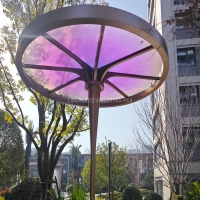Welcome to the website for landscape facilities products and knowledge.
How does the thickness of the countertop material affect the durability and appearance of a landscape bar counter?
The thickness of a countertop material serves as a critical determinant in both the structural integrity and visual presence of a landscape bar counter. Typically ranging from 2cm (3/4") to 5cm (2") or more, this dimension directly influences how the counter withstands daily use and anchors the space aesthetically.
From a durability perspective, thicker countertops generally offer superior load-bearing capacity and resistance to flexing or cracking, especially in longer unsupported spans. A 3cm (1-1/4") slab provides substantial strength for most residential applications, while 4cm (1-1/2") or thicker materials become advisable for commercial settings or counters with significant overhangs. The added mass helps absorb impact better and reduces vibration transmission. Thicker materials also allow for more pronounced edge profiles without compromising structural stability, enabling durable bullnose, waterfall, or chiseled edge details that would be fragile in thinner slabs.
The appearance transforms equally dramatically with thickness. Thin countertops (2-3cm) present a sleek, contemporary look that appears to float visually, particularly when paired with minimalist supports. Their relative lightness makes them ideal for modern interiors seeking subtlety. Conversely, thicker countertops (4-5cm+) communicate substance and luxury through their visual weight and substantial presence. They create bold horizontal lines that define the space more assertively and permit more dramatic edge treatments that become design focal points. The proportional relationship between countertop thickness and bar base also affects visual balance—thicker tops often require more substantial bases to appear harmonious.
Material behavior further interacts with thickness. Natural stone like granite or quartzite gains impact resistance from additional thickness, while engineered quartz maintains consistent performance across thicknesses due to its resin content. Butcher block thickness affects both stability and the ability to resurface over time. Importantly, the choice between a fully thick slab and a laminated edge (where a thicker edge is applied to a thinner slab) creates both aesthetic and practical trade-offs regarding seam visibility and consistency.
Ultimately, selecting landscape bar counter thickness requires balancing practical load requirements with the desired stylistic statement. Thinner profiles suit contemporary spaces valuing lightness, while thicker slabs create enduring centers of gravity for both physical durability and visual impact.
Related search:

Recommendation
Metal frame with gradient color acrylic combined with high-end shading landscape facilities